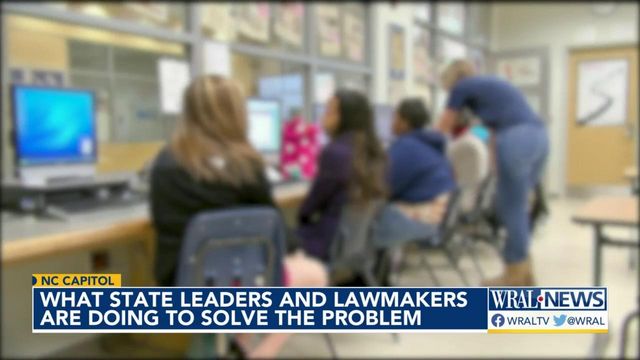More school safety funding to come, NC lawmakers say
As attention turns, again, to school violence, state lawmakers say they will take time to sort through policy options and funding boosts
Posted — UpdatedExpect more school safety funding in the next state budget, the North Carolina Senate’s top leader said Thursday.
Lawmakers will also consider policy changes, though it may be months before consensus emerges on detailed proposals.
Republican Senate Leader Phil Berger said he senses interest at the statehouse in boosting school security funding, something lawmakers did last year as well. Those conversations will be part of the budget process, which is just getting underway and will likely wrap up some time before July 1, the beginning of a new state fiscal year.
“I’m sure we'll have legislation moving on some of the safety issues,” said Berger, R-Rockingham. “But remember, a lot of the things that we deal with that have to do with money necessarily need to be dealt with in the budget.”
Sen. Amy Galey, who sponsored the LGBTQ bill, said she and other lawmakers care deeply about school safety, but that it’s going to take time for ideas to come together, particularly when they need new funding.
“A lot of people would like to see more [school resource officers] in the schools,” said Galey, R-Alamance. “I know that people in Alamance County are really concerned about SROs and having those school resource officers in place, and often funding is an issue for that.”
Research on the effectiveness of police officers in schools, though, finds mixed results, according to Pauline Moore, a political scientist at the Rand Corp. who studies violence and school security. Moore told WRAL News that it’s often hard to say what works at all.
“What works and doesn't work is going to vary pretty significantly across different school contexts, whether we're talking about geographical location, different student demographics, the physical layout of a school, for example,” Moore said.
“There are also some really significant challenges to … really linking the impact of a security measure to an event that did not occur,” Moore said.
Last year's state budget increased the state's share of school resource officer funding in low-wealth districts, and it nearly doubled what the state spends on school officers to $33 million.
It included $205,000 for two new mental health professionals to assist the State Bureau of Investigation with an increase in referrals from school resource officers and local law enforcement, and it boosted school safety grants.
The North Carolina Center for Safer Schools gave out $74 million in those grants last fall, but demand was such that “we can’t give everybody everything they wanted,” the group’s executive director, Karen Fairley, said.
The state’s Department of Public Instruction said it funded about 70% of requests.
He also said some children got guns out of unlocked cars, and that the state was planning a series of public service announcements on safe storage.
That campaign should begin this spring or early summer, a spokesperson for Cooper’s Department of Public Safety said Thursday. A contract to create and implement the campaign was recently awarded, she said in an email.
Neither bill would require people to use gun safes or other safe storage measures. Asked whether lawmakers might require that, state Rep. Erin Paré, a sponsor on the tax break bill, said she’s focused on bills that can pass and be enforced.
“We need to as lawmakers always be mindful of what laws are enforceable,” the Wake County Republican said. “I think for this right now, this is a good way to highlight the need for firearm gun owners to secure their firearms.”
• Credits
Copyright 2024 by Capitol Broadcasting Company. All rights reserved. This material may not be published, broadcast, rewritten or redistributed.






